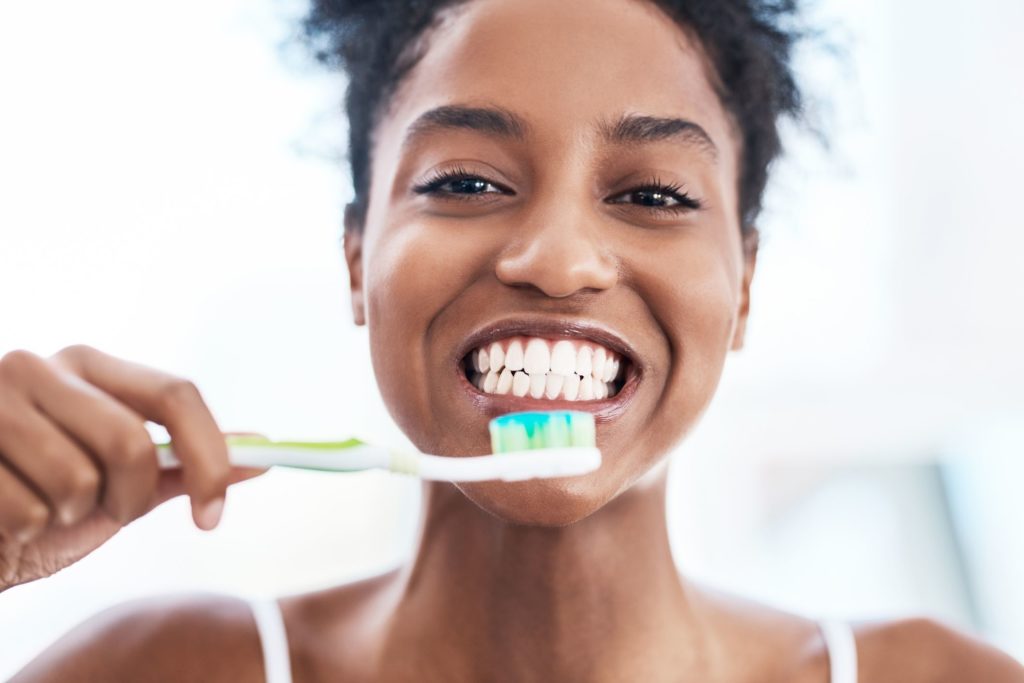Have your teeth been looking dull or yellow lately? If you are unhappy with the appearance of your teeth, you might be looking for a product that can make your teeth appear brighter. You can purchase whitening toothpaste from your local shop that will promise to brighten your smile. But does this product work?
A whitening toothpaste can enhance the tooth color of many dental patients. But some patients might need treatment from their dentist to accomplish their smile aesthetic goals. Read on to learn more about whitening toothpaste and how this product can brighten the color of your smile.

What Does Traditional Toothpaste Do?
You use traditional toothpaste every time you brush your teeth. Toothpaste contains abrasive ingredients that will assist in scrubbing away plaque build-up as well as surface stains on the teeth.
When combined with the act of brushing with a toothbrush and flossing, toothpaste can get your teeth clean and keep your smile feeling its best. Oral hygiene is crucial preventative dental care that will keep your smile healthy.
Though regular toothpaste can help you get rid of surface stains, it can’t penetrate the enamel to reach deeper stains. You will need specialized whitening products to address these cosmetic dental concerns.
How Does Whitening Toothpaste Brighten My Smile?
Whitening toothpaste contains the abrasive ingredients of regular toothpaste. But it also has hydrogen peroxide, a bleaching agent. This will absorb deeper into the tooth enamel and lift stubborn stains.
Then, you can easily brush these stains away when you complete your oral hygiene routine. You can brighten the color of your teeth by several shades if you use this product as directed. Make sure you choose a whitening toothpaste that features the ADA seal to ensure it is from a trusted brand.
Whitening toothpaste can target stains, but because it is a one-size-fits-all product, it might not fully accomplish your smile aesthetic goals. Severe discoloration may need attention from a cosmetic dentist.
Are There Dental Treatments That Will Whiten My Teeth?
Your dentist can give you personalized cosmetic dental treatment to whiten your teeth according to your unique dental goals. They will evaluate your oral health and form a treatment plan that will suit your smile.
In-office teeth whitening treatment will involve a dentist applying bleaching gel to your smile and activating the agents with a special light. They will monitor the process to ensure gorgeous results and minimal side effects.
The dentist might also suggest teeth bonding, a tooth-colored resin that they can sculpt and adhere to the teeth. This can create a brighter and more even look to the teeth. Bonding might be susceptible to staining, so follow guidelines from your dentist to preserve the cosmetic effects.
They may also give you porcelain veneers, custom cap-like shells, which attach to the front of teeth to build a straighter and whiter smile. Veneers will resist staining, but make sure you take care of these fixtures so that they do not break or fall off.
What Whitening Toothpaste Can (And Can’t) Do
Whitening toothpaste works well for removing everyday stains from coffee, tea, or smoking, but it has its limits. These toothpastes contain much weaker whitening ingredients than what dentists use. They have about 1% hydrogen peroxide compared to the 15-40% in professional treatments. When teeth yellow with age because the enamel gets thinner, whitening toothpaste often can’t help enough.
You should know that whitening toothpaste doesn’t work on dental work like crowns or fillings. If you whiten your natural teeth, these restorations might start looking obviously different. For tough stains, you’ll usually get better results from professional treatments than store-bought options alone.
Why You Should Talk to Your Dentist First
Before you start whitening your teeth, it’s smart to visit your dentist. They can figure out exactly why your teeth have stains and recommend the best solution. Maybe it’s surface stains, or maybe your enamel is getting thin. Your dentist will also check for cavities or receding gums that could make whitening uncomfortable or not work well.
If you have sensitive teeth, your dentist can supervise your whitening and include special treatments to reduce discomfort. For people with lots of crowns or fillings, options like veneers might look better than bleaching. Most importantly, your dentist can tell you honestly how much improvement you can expect based on your specific teeth and type of staining.
Keeping Your Smile Bright After Whitening
To make your whitening results last, you’ll need to take good care of your teeth. Simple habits like using a straw for coffee or tea and rinsing with water after eating staining foods can help. Getting regular professional cleanings removes new stains before they set in.
Many dentists suggest using custom whitening trays with professional gel every so often for touch-ups. If you smoke, quitting will prevent fast re-staining. If you grind your teeth, getting that treated protects your enamel. Some people alternate between whitening toothpaste and sensitivity toothpaste as part of their routine. Your dentist can create a maintenance plan that fits your life and how your teeth responded to whitening.
Get Professional Whitening Advice
If you’re ready for a brighter smile that makes you feel more confident, our dental team can help. At Dental Implants & Cosmetic Dentistry of Towson, we create personalized whitening plans for each patient. Call us today at 410-324-2294 or schedule a visit online. We’ll examine your smile and recommend the best approach to help you fall in love with your smile again.
